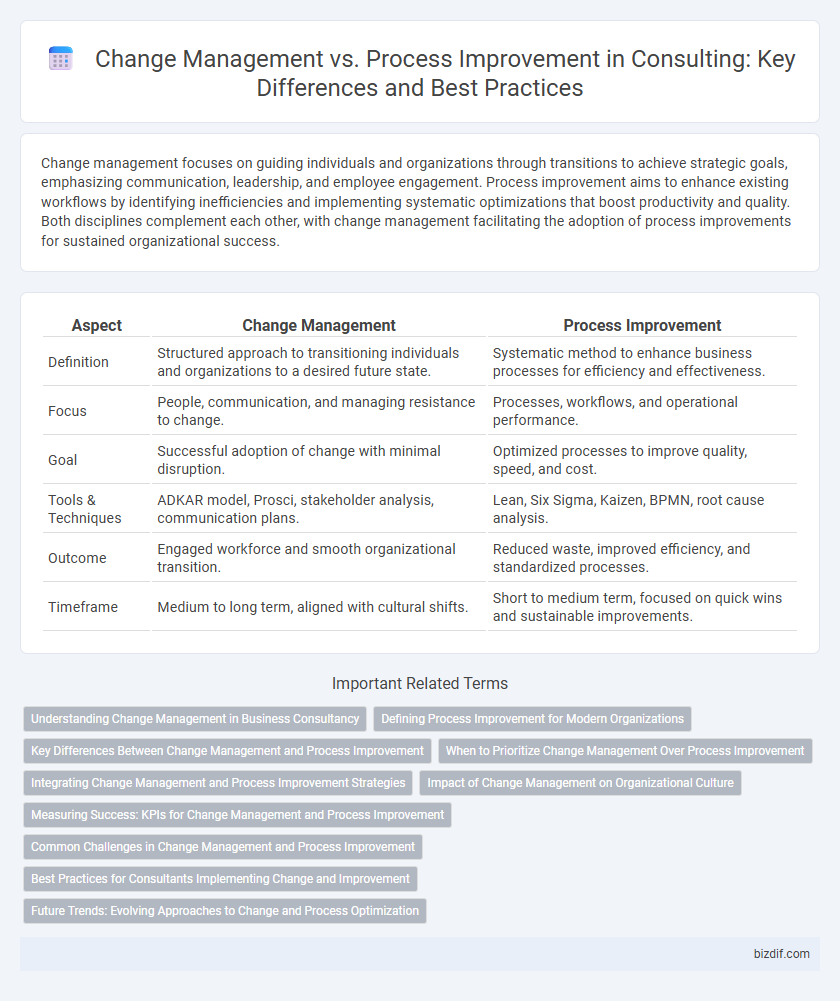Change management focuses on guiding individuals and organizations through transitions to achieve strategic goals, emphasizing communication, leadership, and employee engagement. Process improvement aims to enhance existing workflows by identifying inefficiencies and implementing systematic optimizations that boost productivity and quality. Both disciplines complement each other, with change management facilitating the adoption of process improvements for sustained organizational success.
Table of Comparison
| Aspect | Change Management | Process Improvement |
|---|---|---|
| Definition | Structured approach to transitioning individuals and organizations to a desired future state. | Systematic method to enhance business processes for efficiency and effectiveness. |
| Focus | People, communication, and managing resistance to change. | Processes, workflows, and operational performance. |
| Goal | Successful adoption of change with minimal disruption. | Optimized processes to improve quality, speed, and cost. |
| Tools & Techniques | ADKAR model, Prosci, stakeholder analysis, communication plans. | Lean, Six Sigma, Kaizen, BPMN, root cause analysis. |
| Outcome | Engaged workforce and smooth organizational transition. | Reduced waste, improved efficiency, and standardized processes. |
| Timeframe | Medium to long term, aligned with cultural shifts. | Short to medium term, focused on quick wins and sustainable improvements. |
Understanding Change Management in Business Consultancy
Understanding Change Management in business consultancy involves guiding organizations through transitions by addressing the human and organizational impacts of change. Change management focuses on preparing, supporting, and equipping employees to adopt new processes or technologies effectively, ensuring minimal disruption and sustained benefits. Unlike process improvement, which targets optimizing workflows and operational efficiency, change management prioritizes managing resistance, communication, and cultural shifts to enable successful transformation initiatives.
Defining Process Improvement for Modern Organizations
Process Improvement for modern organizations involves the systematic analysis and enhancement of workflows to increase efficiency, reduce waste, and optimize resource utilization. It leverages methodologies such as Lean, Six Sigma, and Agile to drive measurable performance gains and support continuous improvement. Unlike Change Management, which focuses on managing people and organizational transitions, Process Improvement targets operational processes to deliver sustained business value.
Key Differences Between Change Management and Process Improvement
Change management focuses on guiding organizational transitions by addressing employee adoption and resistance to new strategies, technologies, or structures. Process improvement targets the optimization of specific workflows and operational activities to enhance efficiency, quality, and performance. While change management prioritizes people-centric strategies, process improvement emphasizes systematic analysis and redesign of business processes.
When to Prioritize Change Management Over Process Improvement
Prioritize change management when organizational culture shifts, employee adoption, and communication challenges impact project success more than process inefficiencies. Change management is essential during major technological implementations, mergers, or restructuring where human behavior and mindset adjustments are critical. Focusing on employee engagement and leadership alignment ensures smoother transitions compared to solely optimizing operational processes.
Integrating Change Management and Process Improvement Strategies
Integrating change management and process improvement strategies enhances organizational agility by aligning employee adaptation with optimized workflows. Effective collaboration between change managers and process improvement teams ensures that transformation initiatives are seamlessly executed, minimizing resistance and maximizing operational efficiency. Leveraging tools such as Lean Six Sigma alongside structured change frameworks like ADKAR drives sustainable performance gains across the enterprise.
Impact of Change Management on Organizational Culture
Change management profoundly shapes organizational culture by fostering adaptability, resilience, and employee engagement during transitions, ensuring sustainable transformation. Unlike process improvement, which targets operational efficiency, change management drives cultural alignment with strategic goals by addressing behavioral and mindset shifts. Embedding effective change management practices reduces resistance, accelerates adoption, and cultivates a proactive culture that embraces continuous evolution.
Measuring Success: KPIs for Change Management and Process Improvement
Measuring success in change management involves KPIs such as employee adoption rates, change readiness scores, and stakeholder engagement levels, which indicate the effectiveness of organizational transitions. Process improvement KPIs focus on metrics like cycle time reduction, defect rates, and process efficiency gains to quantify performance enhancements. Comparing these KPIs enables consultants to align change initiatives with operational improvements, ensuring both cultural adaptation and measurable productivity outcomes.
Common Challenges in Change Management and Process Improvement
Common challenges in change management and process improvement include employee resistance, insufficient communication, and lack of stakeholder engagement. Both require careful alignment of organizational goals with clear, consistent messaging to ensure adoption and sustainability. Failure to address cultural barriers and inadequate training often leads to stalled initiatives and diminished outcomes.
Best Practices for Consultants Implementing Change and Improvement
Effective change management requires consultants to prioritize stakeholder engagement, clear communication, and adaptive leadership to ensure seamless transitions. Process improvement demands a data-driven approach, leveraging performance metrics and continuous feedback to optimize operational workflows. Combining both practices, consultants enhance organizational agility by aligning change initiatives with process enhancements, driving sustainable growth and efficiency.
Future Trends: Evolving Approaches to Change and Process Optimization
Emerging trends in Change Management emphasize agile methodologies, leveraging AI-driven analytics to predict resistance and tailor interventions with precision. Process Improvement increasingly integrates robotic process automation (RPA) and machine learning to enhance efficiency and reduce operational costs. The convergence of these disciplines fosters adaptive organizational cultures that sustain continuous transformation and innovation.
Change Management vs Process Improvement Infographic

 bizdif.com
bizdif.com